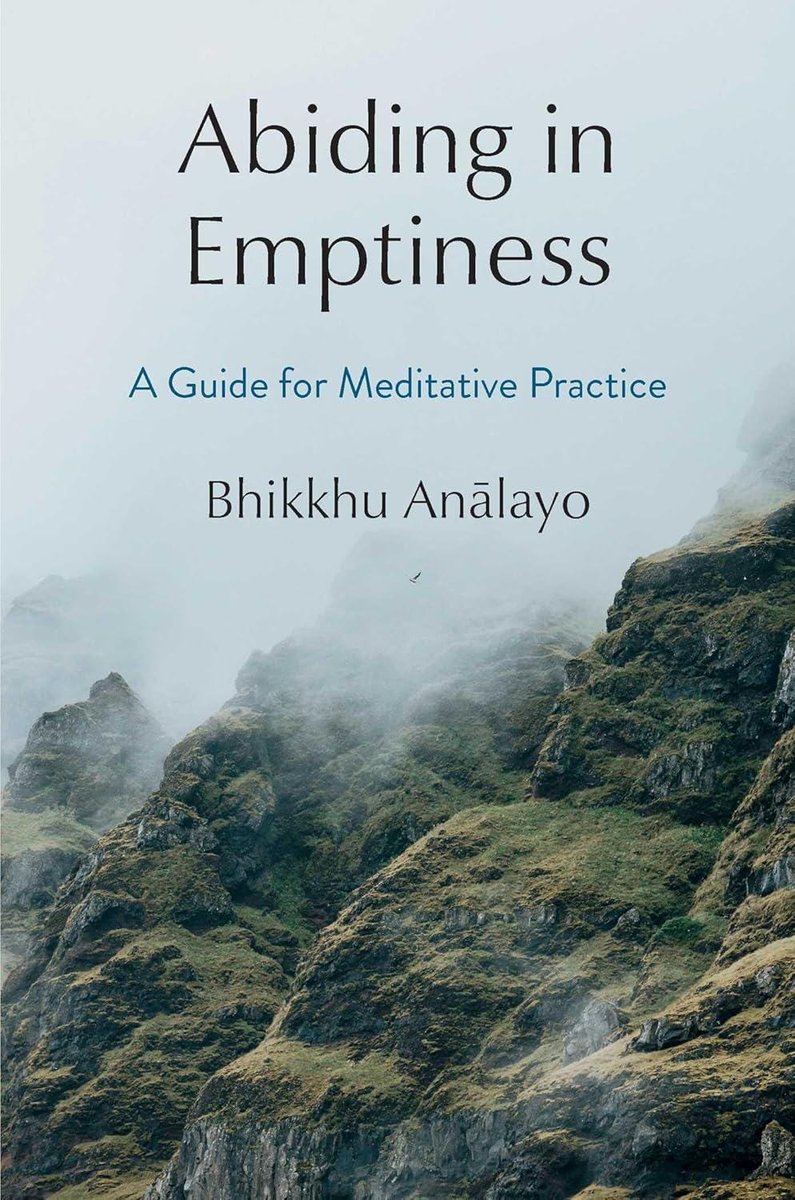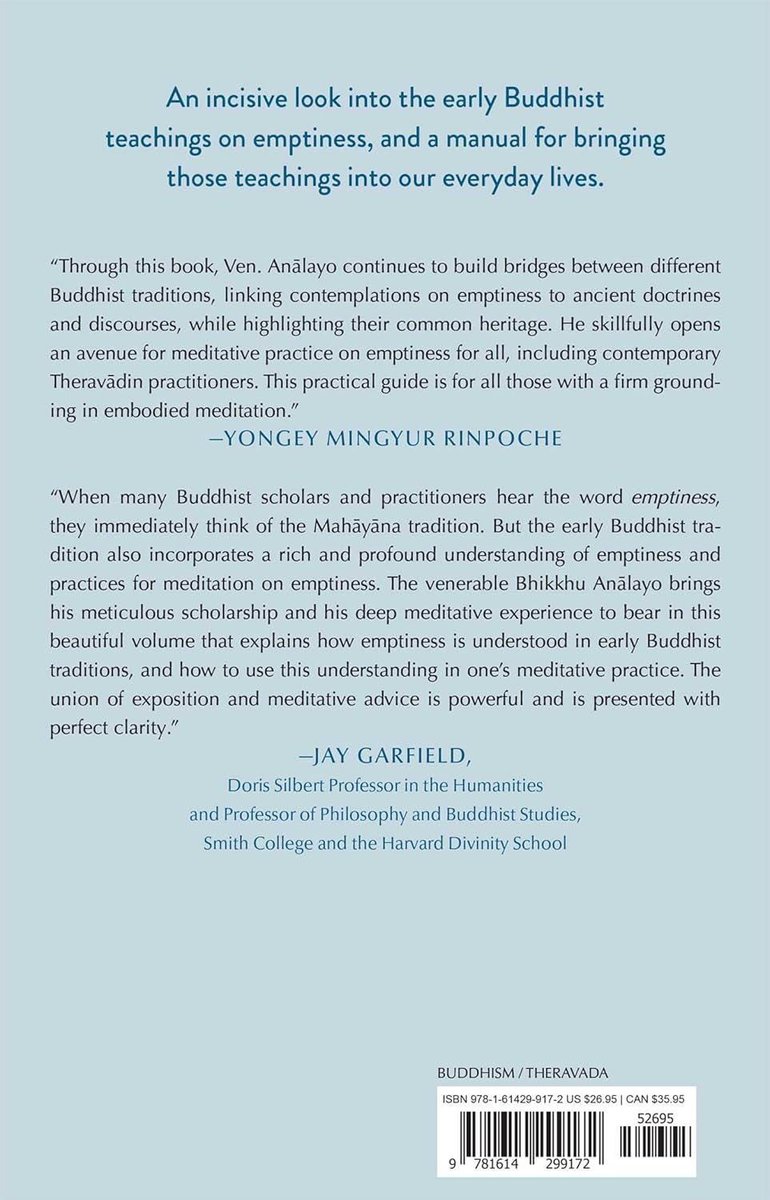Abiding in Emptiness: A Guide for Meditative Practice
$37.95
Abiding in Emptiness: A Guide for Meditative Practice
Contributor(s): Analayo, Bhikkhu (Author)
Publisher: Wisdom Publications
ISBN: 161429917X
Physical Info: 0.9" H x 9.0" L x 6.2" W (1.0 lbs) 200 pages
Abiding in Emptiness presents a practice-related exploration of emptiness in daily life and formal meditation, based on instructions found in the Buddha's Greater and the Smaller Discourses on Emptiness. This presentation provides translations of the relevant textual portions followed by explanations, a summary of the main points covered in each chapter, and practice instructions. The presentation in what follows is firmly grounded in early Buddhist thought, contextualized within the doctrinal framework provided by the early discourses, in clear awareness that this differs in some respects from perspectives underlying the Chan and the Mahåamudråa / Dzogchen traditions. Versions of the Greater and the Smaller Discourses on Emptiness exist in Påali, Chinese, and Tibetan. Nevertheless, meditation on emptiness in its various forms has not garnered as much attention from Theravåadins as it has from practitioners of Chinese and Tibetan Buddhism. In an attempt to build a bridge between these different traditions and to facilitate an adoption of emptiness practices by contemporary practitioners operating within the framework of Theravåada thought, the translations are based entirely on Påali discourse passages. The author's annotations provide a comparative perspective on such quotations. The main part of each chapter in this book consists in practice-related explorations of quotations from the Påali version of the Greater and the Smaller Discourses on Emptiness (the Mahåasuänänatasutta and the Cåuòla- suänänatasutta). Toward the end of each exploration, the author presents a verse, translated from some other Påali text, which in one way or another captures in a poetical manner some of the main points to be kept in mind, and a summary of the main points covered in the exploration. The first part of the verse taken up in the first chapter, entirely dedicated to daily-life dimensions of emptiness practice as the indispensable foundation for going deep in formal sitting, can also serve to convey the main theme underlying this whole book"--
Biographical Note:
Bhikkhu Analayo is a scholar of early Buddhism and a meditation teacher. He completed his PhD research on the Satipatthanasutta at the University of Peradeniya, Sri Lanka, in 2000 and his habilitation research with a comparative study of the Majjhima Nikaya in the light of its Chinese, Sanskrit, and Tibetan parallels at the University of Marburg, Germany in 2007. His over five hundred publications are for the most part based on comparative studies, with a special interest in topics related to meditation and the role of women in Buddhism.
Review Quotes:
"When many Buddhist scholars and practitioners hear the word emptiness, they immediately think of the Mahayana tradition. But the early Buddhist tradition also incorporates a rich and profound understanding of emptiness and practices for meditation on emptiness. The venerable Bhikkhu Analayo brings his meticulous scholarship and his deep meditative experience to bear in this beautiful volume that explains how emptiness is understood in early Buddhist traditions, and how to use this understanding in one's meditative practice. The union of exposition and meditative advice is powerful and is presented with perfect clarity."-- Jay Garfield, Doris Silbert Professor in the Humanities and Professor of Philosophy and Buddhist Studies, Smith College and the Harvard Divinity School
Review Quotes:
"Through this book, Ven. Analayo continues to build bridges between different Buddhist traditions, linking contemplations on emptiness to ancient doctrines and discourses, while highlighting their common heritage. He skillfully opens an avenue for meditative practice on emptiness for all, including contemporary Theravadin practitioners. This practical guide is for all those with a firm grounding in embodied meditation."-- Yongey Mingyur Rinpoche
Publisher Marketing:
An incisive look into the early Buddhist teachings on emptiness, and a manual for bringing those teachings into our everyday lives.
Before the growth of the Mahayana and the Perfection of Wisdom, the Buddha gave his own teachings, to his attendant Ananda, on the importance of emptiness (Pali sunnata, Sanskrit sunyata) in formal meditation and everyday practice. In this volume, renowned scholar-monk Bhikkhu Analayo explores these teachings and shows us how to integrate them into our lives.
Bhikkhu Analayo draws from instructions found in the Greater and the Smaller Discourses on Emptiness (the Mahasunnatasutta and the Culasunnatasutta). In each chapter, he provides a translation of a pertinent excerpt from the discourses, follows this with clear and precise explanations of the text, and concludes by offering instructions for practice.
Step by step, beginning with daily life and concluding with Nirvana, Bhikkhu Analayo unpacks the Buddha's teachings on the foundational teaching of emptiness.
Review Citations:
Publishers Weekly 01/15/2024 (EAN 9781614299172, Hardcover)
Contributor Bio:Analayo, Bhikkhu
Bhikkhu Analayo is a scholar of early Buddhism and a meditation teacher. He completed his PhD research on the Satipatthanasutta at the University of Peradeniya, Sri Lanka, in 2000 and his habilitation research with a comparative study of the Majjhima Nikaya in the light of its Chinese, Sanskrit, and Tibetan parallels at the University of Marburg, Germany in 2007. His over five hundred publications are for the most part based on comparative studies, with a special interest in topics related to meditation and the role of women in Buddhism.
Contributor(s): Analayo, Bhikkhu (Author)
Publisher: Wisdom Publications
ISBN: 161429917X
Physical Info: 0.9" H x 9.0" L x 6.2" W (1.0 lbs) 200 pages
Abiding in Emptiness presents a practice-related exploration of emptiness in daily life and formal meditation, based on instructions found in the Buddha's Greater and the Smaller Discourses on Emptiness. This presentation provides translations of the relevant textual portions followed by explanations, a summary of the main points covered in each chapter, and practice instructions. The presentation in what follows is firmly grounded in early Buddhist thought, contextualized within the doctrinal framework provided by the early discourses, in clear awareness that this differs in some respects from perspectives underlying the Chan and the Mahåamudråa / Dzogchen traditions. Versions of the Greater and the Smaller Discourses on Emptiness exist in Påali, Chinese, and Tibetan. Nevertheless, meditation on emptiness in its various forms has not garnered as much attention from Theravåadins as it has from practitioners of Chinese and Tibetan Buddhism. In an attempt to build a bridge between these different traditions and to facilitate an adoption of emptiness practices by contemporary practitioners operating within the framework of Theravåada thought, the translations are based entirely on Påali discourse passages. The author's annotations provide a comparative perspective on such quotations. The main part of each chapter in this book consists in practice-related explorations of quotations from the Påali version of the Greater and the Smaller Discourses on Emptiness (the Mahåasuänänatasutta and the Cåuòla- suänänatasutta). Toward the end of each exploration, the author presents a verse, translated from some other Påali text, which in one way or another captures in a poetical manner some of the main points to be kept in mind, and a summary of the main points covered in the exploration. The first part of the verse taken up in the first chapter, entirely dedicated to daily-life dimensions of emptiness practice as the indispensable foundation for going deep in formal sitting, can also serve to convey the main theme underlying this whole book"--
Biographical Note:
Bhikkhu Analayo is a scholar of early Buddhism and a meditation teacher. He completed his PhD research on the Satipatthanasutta at the University of Peradeniya, Sri Lanka, in 2000 and his habilitation research with a comparative study of the Majjhima Nikaya in the light of its Chinese, Sanskrit, and Tibetan parallels at the University of Marburg, Germany in 2007. His over five hundred publications are for the most part based on comparative studies, with a special interest in topics related to meditation and the role of women in Buddhism.
Review Quotes:
"When many Buddhist scholars and practitioners hear the word emptiness, they immediately think of the Mahayana tradition. But the early Buddhist tradition also incorporates a rich and profound understanding of emptiness and practices for meditation on emptiness. The venerable Bhikkhu Analayo brings his meticulous scholarship and his deep meditative experience to bear in this beautiful volume that explains how emptiness is understood in early Buddhist traditions, and how to use this understanding in one's meditative practice. The union of exposition and meditative advice is powerful and is presented with perfect clarity."-- Jay Garfield, Doris Silbert Professor in the Humanities and Professor of Philosophy and Buddhist Studies, Smith College and the Harvard Divinity School
Review Quotes:
"Through this book, Ven. Analayo continues to build bridges between different Buddhist traditions, linking contemplations on emptiness to ancient doctrines and discourses, while highlighting their common heritage. He skillfully opens an avenue for meditative practice on emptiness for all, including contemporary Theravadin practitioners. This practical guide is for all those with a firm grounding in embodied meditation."-- Yongey Mingyur Rinpoche
Publisher Marketing:
An incisive look into the early Buddhist teachings on emptiness, and a manual for bringing those teachings into our everyday lives.
Before the growth of the Mahayana and the Perfection of Wisdom, the Buddha gave his own teachings, to his attendant Ananda, on the importance of emptiness (Pali sunnata, Sanskrit sunyata) in formal meditation and everyday practice. In this volume, renowned scholar-monk Bhikkhu Analayo explores these teachings and shows us how to integrate them into our lives.
Bhikkhu Analayo draws from instructions found in the Greater and the Smaller Discourses on Emptiness (the Mahasunnatasutta and the Culasunnatasutta). In each chapter, he provides a translation of a pertinent excerpt from the discourses, follows this with clear and precise explanations of the text, and concludes by offering instructions for practice.
Step by step, beginning with daily life and concluding with Nirvana, Bhikkhu Analayo unpacks the Buddha's teachings on the foundational teaching of emptiness.
Review Citations:
Publishers Weekly 01/15/2024 (EAN 9781614299172, Hardcover)
Contributor Bio:Analayo, Bhikkhu
Bhikkhu Analayo is a scholar of early Buddhism and a meditation teacher. He completed his PhD research on the Satipatthanasutta at the University of Peradeniya, Sri Lanka, in 2000 and his habilitation research with a comparative study of the Majjhima Nikaya in the light of its Chinese, Sanskrit, and Tibetan parallels at the University of Marburg, Germany in 2007. His over five hundred publications are for the most part based on comparative studies, with a special interest in topics related to meditation and the role of women in Buddhism.




